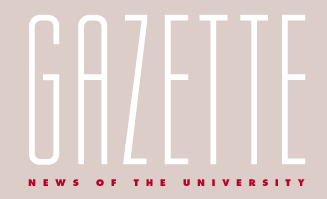 |
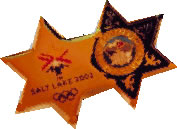
The University of Utah and
the 2002 Olympic Winter Games: Freqently Asked Questions
| WHAT IS THE UNIVERSITY’S INVOLVEMENT IN THE 2002 OLYMPIC WINTER GAMES? |
The U is the
official site of the 2002 Olympic and Paralympic Villages and Rice-Eccles
Olympic Stadium. It is also the site of several activities that are part
of the Cultural Olympiad. Heritage Commons at historic
Fort Douglas will house more than 3,500 athletes and officials for the
Olympic Winter Games and 1,100 athletes and officials for the Paralympic
Winter Games. The new housing development, fully occupied by students
since fall 2000, was financed through a combination of a revenue bond
and a $28 million user fee from the Salt Lake Organizing Committee (SLOC).
As the Olympic Village, Heritage Commons will be in SLOC’s control
Jan. 9 – Mar. 2, 2002. Athletes will receive care from University
Hospital and Clinics through the Polyclinic, a multipurpose acute and
emergent care facility within the Village. The Daily Utah Chronicle
will be the official publication for the Olympic Village. A smaller portion
of the area will be used for the Paralympic Village Mar. 2 –Mar.
19. All of Heritage Commons will be returned to the University by Mar.
27. The Opening and Closing Ceremonies for the 2002 Olympic Winter Games,
and the Opening Ceremony for the Paralympic Winter Games will be held
in Rice-Eccles Olympic Stadium. The University will receive $8.3 million
from SLOC at the end of 2002 for use of the stadium. No state educational
funds, student fees, and/or tuition are being used to support the Games.
| WHEN ARE THE 2002 OLYMPIC WINTER GAMES? |
- The 2002 Olympic Winter Games take place Feb. 8-24, 2002.
- The 2002 ParalympicWinter Games take place Mar. 7-16, 2002.
| WILL THE CAMPUS BE OPEN? |
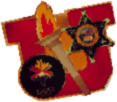
Except for Feb. 6, the day of a dress rehearsal of the Opening Ceremonies,
and Feb. 8, the day of the Opening Ceremonies of the Games, the campus
will be open for business. The modified Spring semester calendar is as
follows: Jan. 3: Spring semester 2002 classes begin Feb. 2-26: Extended
Spring Break (campus remains open) May 2: Classes end day 10: Commencement
One of the fundamental principles in the University’s agreement to
host the Village and Ceremonies is that no student will be delayed in
receiving his or her degree as a result of the University’s involvement
in the Games.
| WHAT HAPPENS TO STUDENTS LIVING IN THE RESIDENTIAL LIVING FACILITIES IN HERITAGE COMMONS? |
Because Heritage Commons on the grounds of Fort Douglas will become the Olympic Village, students will not be able to live in those facilities from mid-December to mid-March. Instead, they will be accommodated in the original residence halls—Austin, Ballif, and Van Cott. Students have the option of living in the original residence halls for the entire Spring semester, or moving back to Heritage Commons in mid-March. The original residence halls will remain open during the extended Spring Break (Feb. 2-26) for students who want to stay on campus for the Games. Meals for students will be served in the newly renovated Crimson Underground in Olpin Union rather than in the Heritage Center.
| HOW WILL PARKING AND TRANSPORTATION BE AFFECTED? |
Because of activities in the
two secured venues (Rice-Eccles Olympic Stadium and the Olympic Village),
there will be changes in parking availability and transportation routes
beginning in November. South Campus Drive between the Field House and
Rice-Eccles Stadium will be closed from Nov. 12 until the end of March.
Temporary road closures and traffic restrictions will affect roadways
near the stadium Feb. 4, 6, 7,
8, 23, 24 and March 7 because of Olympic and Paralympic Ceremonies. Travel
on the east side of the Olympic Village between Research Park and the
Health Sciences Center will be restricted Jan. 18 – March 27.
The new University light rail line will be operational in December, offering an alternative means of transportation to the campus. The line will run only until 1 p.m. on the following days: Feb. 6 (full dress rehearsal of the Opening Ceremonies), Feb. 8 (Opening Ceremonies), and Feb. 24 (Closing Ceremonies). Otherwise, trains will run to the University every 15 minutes, from 6 a.m. to 11 p.m.
Some existing University parking lots have been allocated for the Games during specified times. Parking will be most difficult during January and March, when classes are in session. During this period, everyone is urged to take transit or carpool. Temporary overflow parking will also be provided on and near campus, and there will be increased shuttle service to accommodate these changes. During the period of the Olympic Games (Feb. 8-24), Spring Break conditions will exist on campus. The areas surrounding Rice-Eccles Olympic Stadium and the Olympic Village will be most affected.
For more information, call Parking Services at 801-581-6415 or visit www.parking.utah.edu.
During the 2002 Olympic Winter Games, two large restaurants, Douglas Dining and Connor Dining, will operate within the Residential Zone of the Olympic Village to serve residents and guests. Connor Dining, upstairs in the Peterson Heritage Center, will be open to athletes. A temporary kitchen and dining facility, Douglas Dining will be available to athletes and support staff and will have a nutritionist on hand to offer dietary advice. A computer kiosk will also be available 24 hours a day where residents can obtain nutritional information on each dish served at the Village.
| HOW ARE SECURITY MEASURES ORGANIZED? |
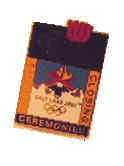 The
security of Games venues is the responsibility of the Utah Olympic Public
Safety Command (UOPSC), which includes representation from the U as well
as all concerned federal and state agencies. Safety on campus remains
the responsibility of the University’s public safety department.
University officials have been meeting frequently and regularly with these
and other agencies for several years and continue to monitor developments
carefully. As new information or funding becomes available, adjustments
will be contemplated. The campus will close to normal business operations
Feb. 6 and Feb. 8 not because of external threats to campus but because
public safety is implicated in the difficulties of traffic management
and access controls that will surround the Opening Ceremonies and their
dress rehearsal. Implicit in the security arrangements is the principle
that student academic progress will not be delayed and that “to the
extent possible,” research, service, and library functions of the
University will not be disrupted.
The
security of Games venues is the responsibility of the Utah Olympic Public
Safety Command (UOPSC), which includes representation from the U as well
as all concerned federal and state agencies. Safety on campus remains
the responsibility of the University’s public safety department.
University officials have been meeting frequently and regularly with these
and other agencies for several years and continue to monitor developments
carefully. As new information or funding becomes available, adjustments
will be contemplated. The campus will close to normal business operations
Feb. 6 and Feb. 8 not because of external threats to campus but because
public safety is implicated in the difficulties of traffic management
and access controls that will surround the Opening Ceremonies and their
dress rehearsal. Implicit in the security arrangements is the principle
that student academic progress will not be delayed and that “to the
extent possible,” research, service, and library functions of the
University will not be disrupted.
| WHERE CAN I GO FOR MORE INFORMATION? |
The 2002 Olympic Coordination
Office at the U can be reached at 801-585-7180 or
www.utah.edu/2002. The 2002 Olympic
Winter Games Web site is www.saltlake2002.com.
| IN MEMORIAM |
Willam Farr Christensen,
99, founder of the U of U Department of Ballet, and founder and director
of the University Theater Ballet, which evolved into Civic Ballet and
then Ballet West. The first person in the United States to choreograph
full-length versions of The Nutcracker and other ballets, “Mr. C”
received many honors during his lifetime, including the CORPS de Ballet
International Award in 2000 for lifetime achievement and distinguished
service. The Hayes/Christensen Theatre in the Marriott Center for Dance
is named for him and for modern dance pioneer Elizabeth R. Hayes.
James E. Faraone, 48, Salt Lake City police sergeant and student
in the Department of Family and Consumer Studies. Faraone was featured
in a Fall 2001 Continuum article on the 100th anniversary of the
department.
|
|
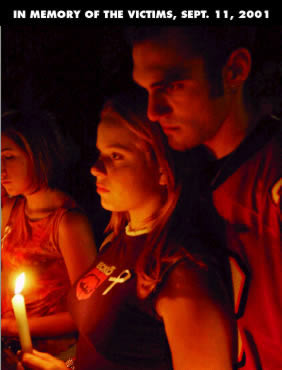 |